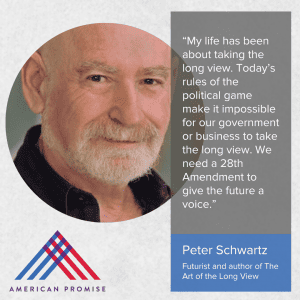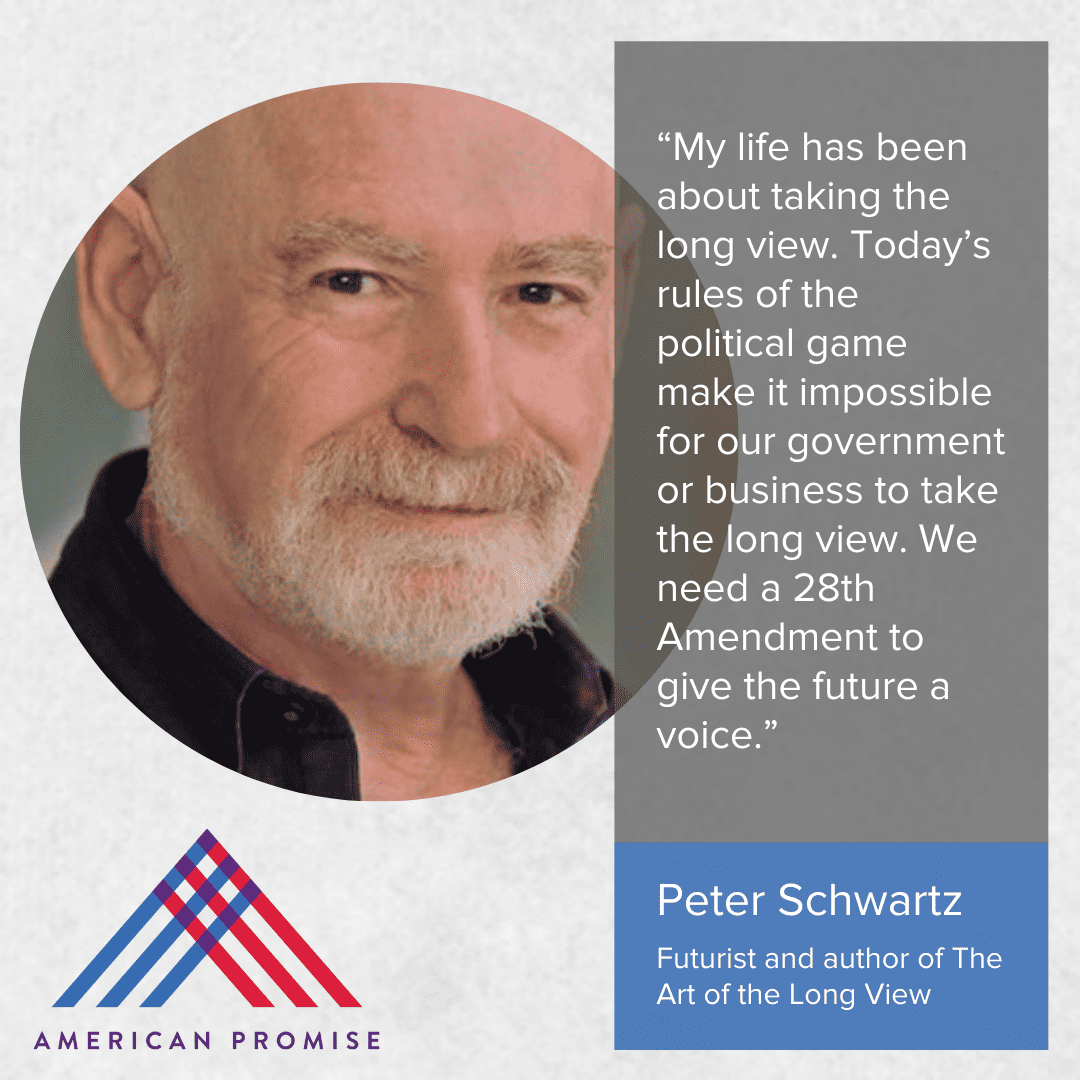An internationally known futurist and business strategist, Peter Schwartz specializes in scenario planning, working with corporations, governments, and other institutions to create alternative perspectives of the future and develop robust strategies for a changing and uncertain world. As part of the cross-partisan National Business Network advocating for the 28th Amendment, Peter says reasonable limits on money in politics will encourage business innovation and a long-term approach to build a better future.
In this Q&A video, Peter explains why business leaders who adopt a long-term mindset that serves multiple stakeholders — customers, environment, community, workers — as well as shareholders will build more resilient companies and a stronger economy that benefits more people. Watch the video or keep reading for excerpts from Peter’s comments during the video Q&A.
Why Business Needs Political Spending Reform to Foster a Longer-Term, Stakeholder-Driven Approach: A Q&A with Futurist Peter Schwartz
Why have you focused so much on scenario planning and helping people take the “long view”?
Schwartz: For most of human history the future was like today and yesterday. My children’s lives were going to be like mine, and mine was like my grandparents’. … Generation after generation, life for most people on the planet was unchanging. And then beginning with the Renaissance and taking off during the Scientific and Industrial Revolutions, that all changed. That is, tomorrow was not like today and yesterday. The future was no longer what it used to be. It was novel; it was unpredictable. And it was especially unpredictable because of science, which invented new ideas that led to things that were unimaginable before.
Science and technology created the foundation for uncertainty. And as the world grew increasingly connected and more complex, then systems became kind of complex and generated uncertainty as well. So we are now in a time of fundamental, irreducible uncertainty. Therefore we require new ways of thinking about the future in the face of that uncertainty. That’s what scenario planning is about.
Read more from Peter Schwartz.
How do the wrong rules of competition hurt our economy?
It creates distortions in the market. It permits weak players to compete unfairly against the stronger players. … The question is, do you want rules that favor the weak competitors? And that’s generally what … lobbying efforts are about. The strong competitors do not have to undermine regulation; the weak competitors do.
How does political spending enable short-termers to defeat the interests of other stakeholders and the future?
 It is so clear that the government spending rules that have permitted corporations to be treated as people have absolutely, fundamentally undermined the democratic process. They have given them unique weight. … Corporations are one stakeholder among many. There are other political institutions. But most of all there are the citizens. Citizens may have different views that agree in some cases or disagree with others with respect to business. That’s quite legitimate and an appropriate place for that to be expressed.
It is so clear that the government spending rules that have permitted corporations to be treated as people have absolutely, fundamentally undermined the democratic process. They have given them unique weight. … Corporations are one stakeholder among many. There are other political institutions. But most of all there are the citizens. Citizens may have different views that agree in some cases or disagree with others with respect to business. That’s quite legitimate and an appropriate place for that to be expressed.
But what is unique is the concentration of resources in the hands of business. It isn’t that business shouldn’t have a voice; it is about the scale of resources that they bring into it which creates disproportionate power and influence in that process. As a result, the short-termers in business who have yet to take that long view then have the ability to distort regulation in favor of the short run rather than the long run.
Do you believe business has an interest in structural reform, including a Constitutional amendment to authorize reasonable limits on political spending?
The ones who see a better future for their companies, who have that long view, unquestionably would support taking the big money out of politics, taking away the unique power of big business to influence power. They see the quality of democracy being undermined by that — the disincentive to participate; the cynicism it puts in the mind of the public. … It is very much in the interests of far-sighted businesses who do take the long view to see an end to the kind of funding model that we now use for campaigns and therefore support a Constitutional amendment, which I do, to eliminate that kind of funding.






